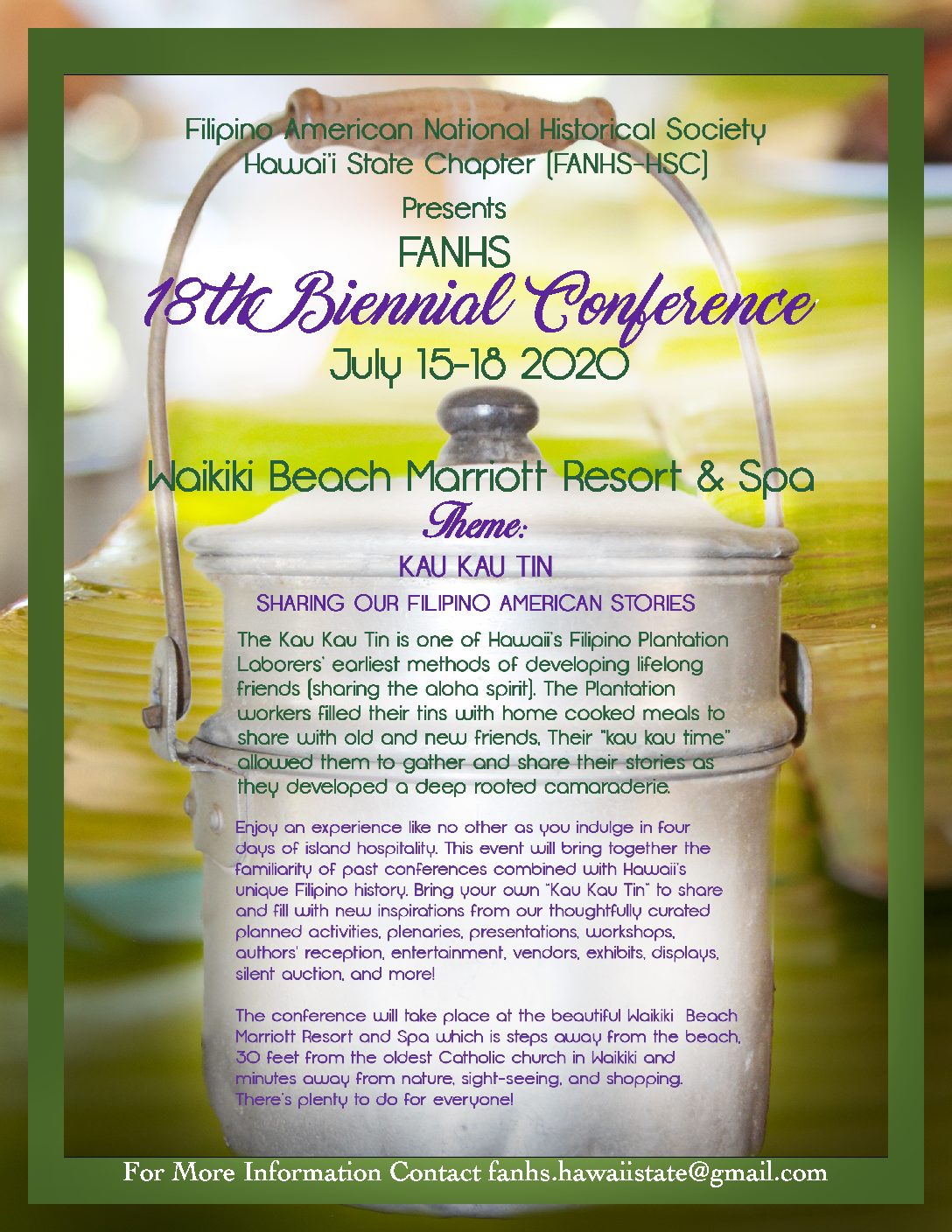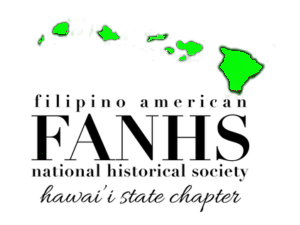
CONFERENCE THEME: KAU KAU TIN: SHARING FILIPINO AMERICAN STORIES
Plantation era children now approximately at the ages of 50-90+-years-old remember the kau kau tin with a silent pause, a smile, a wisp of reminiscent respect, and humor. The kau kau tin draws memories to the present of their older siblings, parents, grandparents,— loved ones, and friends who worked the fields, mills, and canneries.
The FANHS 18th Biennial Conference theme, KAU KAU TIN: Sharing Filipino American Stories, reflects the initial stages of Hawaii’s Filipino plantation laborer’s history, their social environment; —1900, to where we are now; —2020. The early 1900s was a time, decades before the Filipino laborers were referred to as sakadas. Before being referenced as sakadas, they were referred to as Hawaii’s Filipino Plantation Laborers.
The late 1800s saw field laborers from many countries arriving in Hawaii seeking improved living conditions.No televisions. Initially, no radios among the laborers, most of whom were unable to read the newspapers of the day. Many were unable to speak more than one language. As strangers on an isolated group of islands in the middle of the Pacific Ocean, 2500 miles from the nearest landmass, they were generally unable to communicate verbally with laborers from other countries. It seemed safer, at that time, to live and congregate in camps and villages with their own “countrymen and women.”
Early on, since they were likely unable to speak any language but their own, they communicated with those who spoke their language. On rare occasions, they sat and worked as silent strangers with others who did not share a common language. Perhaps a shared smile and a nod. This situation would eventually improve.
Hawaii’s field laborers prepared their meals in the pre-dawn hours and carried their food to work in a kau kau tin. As strangers from many different countries, the field laborers eventually came together during their kau kau time—their lunchtime. They often sat on the dirt road, in direct sunshine in warm protective clothing. They began to “motion” invitations to other field laborers with a nod, a smile, a hand gesture to taste and share their food. Perhaps during their kau kau time, one man might laugh as he sees and points to draw attention to a big bug crawling on another man’s boot. Or, a man sees a centipede approaching another man’s knee, whacks it away, saving that other man from severe pain. A smile, a nod, humor, and gratitude: the start of new friendships.
Plantation workers ventured out of their comfort zone and contributed to the ongoing development of a new common language—“Broken English”—now known as “Pidgin English” or Hawaiian Creole English. Finally, when they were able to share their food and communicate verbally, however, limited, with their new friends, networking and cultivating lifelong friendships became manageable. They lived out their lives, “sharing the Aloha Spirit.” Their examples perpetuated by their descendants. By sharing what was in their kau kau tin, the plantation laborers initiated a pattern followed today.dsxaas
While preparing for this Conference, a group of 13 “local” Filipinas and Filipinos, met on a weekend in June 2018, in Hilo Hawaii. They spent hours talking about FANHS and discussing the FANHS 2020 Conference while sharing 13 different potluck food dishes.
The group’s task for the day was to create a theme for FANHS 2020. One Filipina offered a simple suggestion. Another Filipina added to her suggestion. They all sat in silence, perhaps recalling personal memories of their experiences, which the two Filipinas’ suggestions had evoked. In a time of abundant social complexities, No other theme suggestion appeared necessary beyond the simple one they were considering. They agreed, this was the theme best suited for this Conference. Subsequently, so did other Filipinos across the state. The chosen theme was also a reflection of other ethnic groups and cultures that found their way to Hawaii as the1800s marched into the 20th century.
Hawaii Island had selected FANHS’ theme, Kau Kau Tin: Sharing Filipino American Stories. It’s a theme a seven-year-old could enjoy discussing.
We are a mixed-race culture, more so than it appears. A mixed-race culture is a significant piece of Hawaii’s Filipino American History in part due to the kau kau tin sharing that began during the early plantation era.
Many have developed social/business networks and lifelong friendships that started at a FANHS Conference. Those networks and friendships continue to re-energize at subsequent conferences. Whether we have a big FANHS Conference or a little one, hundreds of people continue to attend FANHS the next Conference. Each FANHS Conference is unique. Presentations are unique as well.
For this Conference, we have a two-part theme. The second part: Sharing Filipino American Stories is a special invitation that reflects a joyful welcoming message to all Filipino Americans and friends to join us at our FANHS 2020 Conference in a celebratory gathering and sharing of national and international Filipino American History and History-in-the-Making.
The second part also reflects the teaching and learning opportunities, communicating, networking, which many enjoy doing, and opportunities for creating life-long friends.
Presently, the Hawaii State Conference committee and its FANHS co-members from other national chapters are working diligently, and we are all excited about sharing the results of our efforts with you so you will have some extraordinary memories to take home to share with others.
Last but not least, as the saying goes: this event will only be the best it can be with your help as a participant, presenter, author, artist, vendor, exhibitor, entertainer, and as a donor,
So, bring your own kau kau tin (your mind—your invisible me(n)tal vessel filled with curiosity and knowledge) and share the contents of your kau kau tin with others. And when it is time to leave us, gather your knowledge and experiences from all the event’s activities, and take them home to enjoy again, Nurture your new network and friendships until we meet again at the next conference if not before then.
-
- SEE 2020 UPDATES FOR LATEST INFO 2020 UPDATES FANHS CONFERENCE MISCELLANEOUS DETAILS
- Much of the information listed below is found under the “CONFERENCE” pull-down menu. Please use the menu as a guide to the following. Please use links to find information on the following (As they become available, they will be indicated where applicable).
- Pre-Conference: (Reservations): Conference Registration, Resort Reservations, and Information
- Pre-Conference: (Tuesday): Golf Tournament, Personal Research Work
- Pre-Conference: (Wednesday): Oahu Tour, Informal Welcome, Fashion Show
- Official Conference (Thursday-Saturday): Formal Welcome, Plenaries, Presentations, Workshops, Entertainment, Silent Auction, Vendors, Exhibits, Authors Reception, Social Gathering, Semi-Formal Gala, Conference Schedule, and more.
- Our Marketing Team will be sharing incoming information via social media.
- Check our website for directions and new information.
- A water dispenser is available in the lobby for those interested in filling water bottles/flasks.
- SEE 2020 UPDATES FOR LATEST INFO 2020 UPDATES FANHS CONFERENCE MISCELLANEOUS DETAILS
FANHS CONFERENCE LOCATION and DATES
Waikiki Beach Marriott Resort & Spa
Click for map →→ 2552 Kalakaua Avenue, Honolulu, HI 96815
The Resort is located across the street from Waikiki Beach and St. Augustine Catholic Church (green Gable roof).
Click on→→ Waikiki Beach Marriott Resort & Spa
RESORT INFORMATION and RESERVATION
Conference attendees are encouraged to reserve a hotel room by calling the Marriott Resort Reservation Office at (800) 266-9432. Discount available 3 days pre- and post- conference. To get your discount mention code: Filipino American National Historical Society Hawaii 2020 Annual Meeting.
Please know that CREDIT CARD information will be required over the phone to guarantee your reservation. This information will “Hold” your reservation until the day of arrival. Charges will not be applied to your card until the day of your arrival or reservation. Please check on cancellation conditions when reserving your room.
All presentations, workshops, vendors, displays, exhibits, Gala, and Silent Auction are located near resort rooms, lounging, and “play” areas. A water dispenser is available in the lobby for those interested in filling water bottles/flasks.
For a video preview of the resort and spa, click here: Waikiki Beach Marriott Resort & Spa
Questions about conference registration or hotel information? Contact:
FANHS HAWAII STATE CHAPTER
fanhs.hawaiistate@gmail.com
